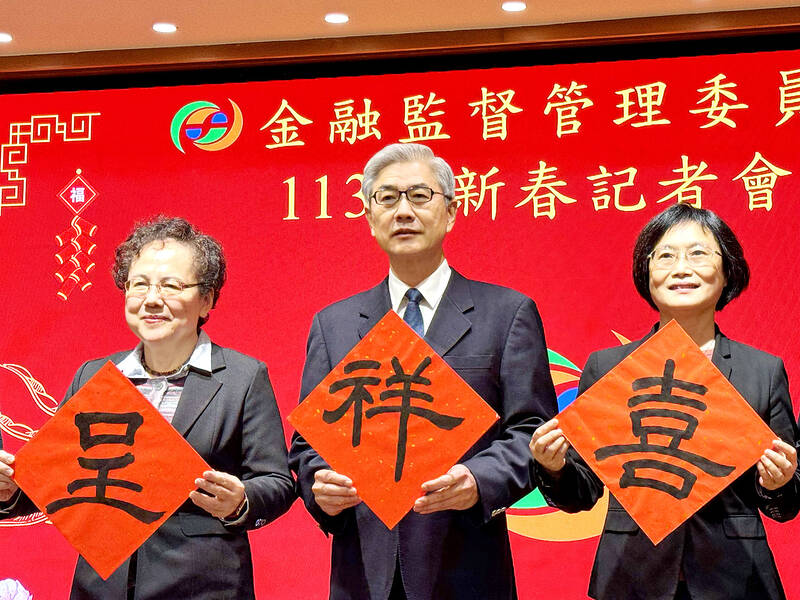Local financial institutions, including banks, insurance companies, securities and futures brokerages, and investment trusts, last year saw aggregate profits soar to their second-highest in history, despite headwinds faced by life insurers in the final two months of the year, the Financial Supervisory Commission (FSC) said yesterday.
Their combined pretax profit totaled NT$703.6 billion (US$22.58 billion), up 46.71 percent from NT$479.6 billion a year earlier, the commission’s data showed.
Financial institutions posted record profits of NT$935.55 billion in 2021, the data showed.

Photo: Kelson Wang, Taipei Times
Banks were the largest contributor to last year’s profit growth, reporting record pretax profits of NT$505.7 billion, up 17.03 percent from NT$432.1 billion in 2022, thanks to rising currency swap income, a capital market recovery, and double-digit percentage growth in fee income for wealth management and credit card businesses, the commission said.
Securities and futures brokerages and investment trusts followed with a combined pretax profit of NT$99.8 billion, a 50.98 percent increase from NT$66.1 billion the previous year, buoyed by a stock market boom, it said.
Insurance companies posted a lower-than-expected pretax profit of NT$98.1 billion for last year, as life insurers sustained foreign-exchange losses amid the appreciation of the New Taiwan dollar against the US dollar in the November-to-December period, it said.
However, insurance companies’ bottom line last year improved greatly from the previous year, when they registered a combined loss of NT$18.6 billion, it said.
FSC Chairman Thomas Huang (黃天牧) said he is optimistic about the sector’s prospects this year.
While the financial industry is resilient, companies should be cautious about market, credit and liquidity risks, as well as challenges from false information and corporate governance, he told a news conference in New Taipei City.
The commission, which celebrates its 20th anniversary this year, hopes financial institutions would further promote innovation and diversification in financial products without sacrificing financial stability, Huang said.
The FSC will assist the industry in upgrading and moving toward net zero carbon emissions and sustainable development, he added.
To improve odd-lot trading opportunities and efficiency on the Taiwan Stock Exchange (TWSE) and the over-the-counter Taipei Exchange, the commission plans to shorten the matching interval of intraday odd-lot trading from one minute to five seconds by the end of this year, Securities and Futures Bureau Director-General Sam Chang (張振山) told the news conference.
The intraday odd-lot trading system was first implemented in October 2020 to attract small-capital investors.
The commission has requested that the TWSE and the Taipei Exchange revise odd-lot trading regulations and promote activities among securities firms and investors to achieve inclusive finance, Chang said.

‘SWASTICAR’: Tesla CEO Elon Musk’s close association with Donald Trump has prompted opponents to brand him a ‘Nazi’ and resulted in a dramatic drop in sales Demonstrators descended on Tesla Inc dealerships across the US, and in Europe and Canada on Saturday to protest company chief Elon Musk, who has amassed extraordinary power as a top adviser to US President Donald Trump. Waving signs with messages such as “Musk is stealing our money” and “Reclaim our country,” the protests largely took place peacefully following fiery episodes of vandalism on Tesla vehicles, dealerships and other facilities in recent weeks that US officials have denounced as terrorism. Hundreds rallied on Saturday outside the Tesla dealership in Manhattan. Some blasted Musk, the world’s richest man, while others demanded the shuttering of his

ADVERSARIES: The new list includes 11 entities in China and one in Taiwan, which is a local branch of Chinese cloud computing firm Inspur Group The US added dozens of entities to a trade blacklist on Tuesday, the US Department of Commerce said, in part to disrupt Beijing’s artificial intelligence (AI) and advanced computing capabilities. The action affects 80 entities from countries including China, the United Arab Emirates and Iran, with the commerce department citing their “activities contrary to US national security and foreign policy.” Those added to the “entity list” are restricted from obtaining US items and technologies without government authorization. “We will not allow adversaries to exploit American technology to bolster their own militaries and threaten American lives,” US Secretary of Commerce Howard Lutnick said. The entities

Minister of Finance Chuang Tsui-yun (莊翠雲) yesterday told lawmakers that she “would not speculate,” but a “response plan” has been prepared in case Taiwan is targeted by US President Donald Trump’s reciprocal tariffs, which are to be announced on Wednesday next week. The Trump administration, including US Secretary of the Treasury Scott Bessent, has said that much of the proposed reciprocal tariffs would focus on the 15 countries that have the highest trade surpluses with the US. Bessent has referred to those countries as the “dirty 15,” but has not named them. Last year, Taiwan’s US$73.9 billion trade surplus with the US

Prices of gasoline and diesel products at domestic gas stations are to fall NT$0.2 and NT$0.1 per liter respectively this week, even though international crude oil prices rose last week, CPC Corp, Taiwan (台灣中油) and Formosa Petrochemical Corp (台塑石化) said yesterday. International crude oil prices continued rising last week, as the US Energy Information Administration reported a larger-than-expected drop in US commercial crude oil inventories, CPC said in a statement. Based on the company’s floating oil price formula, the cost of crude oil rose 2.38 percent last week from a week earlier, it said. News that US President Donald Trump plans a “secondary